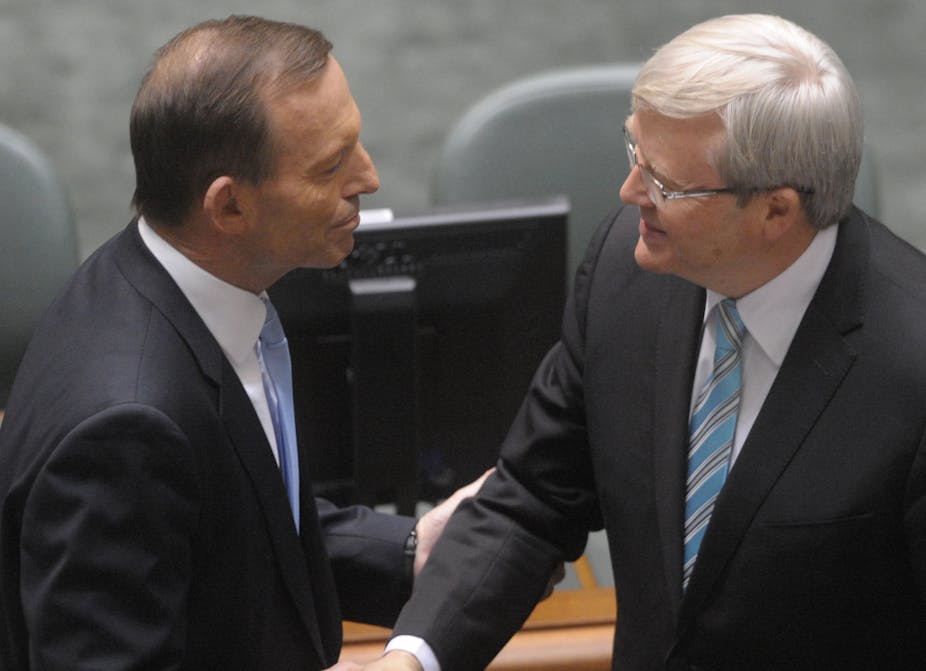The big question for the coming weeks is whether voters’ deep and long-held disillusionment with brand Labor will prevail over their enthusiastic re-engagement with its popular leader.
Labor has reached level pegging on the two-party vote in the major polls (Newspoll, Nielsen). This week’s Nielsen poll indicated it was possible for Labor to win on its figures, because of the swing in Queensland, where the government lost heavily last election.
But requiring a net gain of seats to retain power, Labor needs to lift more to have any confidence it could land a victory in what only weeks ago was the unwinnable election – and no one can yet be sure whether these polls are the high watermark.
The Rudd comeback strategy has two phases. In the pre-campaign period he is seeking to neutralise Labor’s negatives (boats, carbon, debt and deficit), deliver some positives (Better Schools sign ups) and discredit and discombobulate Tony Abbott (who must be remembering how his old boss John Hewson’s trajectory to victory was stopped by the prime ministerial change to Paul Keating).
Once the formal campaign is underway, voters start to pay serious attention. Rudd will conduct a presidential campaign that is future-focused. (Can’t run on Julia Gillard’s record.) The hustings are his natural home.
Malcolm Turnbull has implicitly conceded Tony Abbott’s difficulty in this situation when he recently said the Coalition would present a team approach in contrast to Rudd’s presidential one.
But a lot of attention will be on Abbott and it will be hard for him to avoid mistakes without sounding robotic.
John Howard’s former chief of staff Arthur Sinodinos, now a senator, used to talk about scraping off the barnacles, and that’s what Rudd’s doing.
He has already dealt with the most damaging “barnacle”, by replacing his unpopular predecessor and now he’s rubbing away at her legacy of issues - which three years ago was his legacy that she was trying to sort out. (Rudd’s not bothering with one of the old barnacles – he said this week he had no plans to revisit the mining tax.)
In the boat arrival policy he will announce, Rudd will combine tough local measures to crack down on economic refugees with regional initiatives.
But will voters be convinced by yet another fresh go? Will they add a discount factor after the East Timor solution, the Malaysia solution, the reopening of Nauru and Manus Island, the “no advantage” test? Labor has had so many positions, embracing what it once rejected. Now the government raises questions about the UN refugee convention. Didn’t it previously attack the opposition for doing that?
On the other hand, the Liberals can’t be sure how people will react to a package sold with all the Rudd conviction, against a political background in which people feel warm towards him.
Boats have been a strong issue for the opposition but it had its own ups and downs this week. For a few hours Indonesian foreign minister Marty Natalegawa held out some hope his country would tolerate, or at least be open to consultations on, the tow-back policy. But then he had dinner with Bob Carr and that line was out the window.
In general, Tony Abbott has had another week of being out of form and out of luck.
With Rudd announcing his early move to an emissions trading scheme, Abbott handed the government ammunition with his shocker quote: “Just ask yourself what an emissions trading scheme is all about. It’s a so-called market in the non-delivery of an invisible substance to no one”.
Just made for a comparison with what former PM John Howard said six years ago this week, when he announced details of his proposed ETS. Howard told the Melbourne Press Club: “Climate change is a large, complex and serious global challenge that will occupy the world for decades to come. …
"Being among the first movers on carbon trading in this region will bring new opportunities and we intend to grasp them. The Government will examine how to ensure that Australia becomes a carbon trading hub in the Asia-Pacific region.”
The opposition explains its rejection of an ETS by saying the failure of the Copenhagen climate conference changed everything.
But the combination of Abbott’s line, with its shades of a climate sceptic, the Howard quote which reminds everyone that once the conservatives thought the ETS not just acceptable but an opportunity, and the Rudd decision, offering households modest cost of living relief in 2014-15 all added up to bad news for Abbott.
The ETS debate, however, wasn’t all Rudd’s way. The decision is costly ($3.8 billion), and the biggest saving to offset it – the crackdown on the arrangements for the FBT on cars – has brought some blowback, with the staff sackings planned by one company widely publicised. There is concern within the government about the car industry, and talk about what should be done.
The bring forward of the ETS remains just an election policy unless Rudd recalled parliament to put in legislation. Some people argue he should do this.
But that would be foolishly high risk. It would have the difficulty of making sure all Labor MPs and enough crossbenchers were present and willing to get the measure through the House of Representatives.
And anyway, the legislation would almost certainly be defeated or deferred in the Senate by a combination of the Greens and the Coalition.
Rudd could score a point against Abbott for denying cost of living relief but his own inability to deliver would more likely be the talking point.
To keep the voters in thrall the resurrected Rudd needs to retain an image of the political demigod. That means promising a lot and not being seen to fail – which is why he would be wise to go to an early election.

